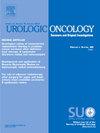MEVROMETOSTAT (PF-06821497) IN COMBINATION WITH ENZALUTAMIDE IN PATIENTS WITH METASTATIC CASTRATION-RESISTANT PROSTATE CANCER PREVIOUSLY TREATED WITH ABIRATERONE ACETATE: THE PHASE 3, RANDOMIZED MEVPRO-1 STUDY
IF 2.4
3区 医学
Q3 ONCOLOGY
Urologic Oncology-seminars and Original Investigations
Pub Date : 2025-03-01
DOI:10.1016/j.urolonc.2024.12.008
引用次数: 0
Abstract
Introduction
Resistance to androgen receptor (AR) pathway inhibitors (ARPI; e.g., abiraterone, enzalutamide) in metastatic castration-resistant prostate cancer (mCRPC) may be driven by preservation of AR signaling through various mechanisms. Enhancer of zeste homolog 2 (EZH2) is implicated in the pathogenesis of prostate cancer and ARPI resistance. Combining ARPI with therapies that modulate alternative signaling pathways, including epigenetic modifiers such as EZH2, could be a promising treatment approach to overcome resistance. Mevrometostat (PF-06821497) is a potent and selective small molecule EZH2 inhibitor. Results from the dose-escalation period of a phase 1 study (NCT03460977) showed promising activity for mevrometostat combined with enzalutamide, with a manageable adverse-event profile in abiraterone-exposed patients with mCRPC (Schweizer MT, et al. J Clin Oncol. 2024;42(16_suppl):5061). The current trial aims to evaluate radiographic progression-free survival (rPFS), overall survival (OS), and safety of mevrometostat plus enzalutamide compared with standard of care in patients with mCRPC previously treated with abiraterone.
Methods
MEVPRO-1 (registry#) is a global, open-label, phase 3 trial in patients with mCRPC aged ≥18 years with progression on/after ≥12 weeks abiraterone, castration testosterone levels ≤50 ng/dL, ECOG performance status 0–2, and life expectancy ≥6 months. Approximately 600 patients will be randomized 1:1 to receive mevrometostat (875mg BD with food) with enzalutamide (160mg QD), or physician's choice of enzalutamide (160mg QD) or docetaxel (75mg/m2 intravenously every 21d). Randomization will be stratified by previous docetaxel in metastatic castration-sensitive setting, physician's choice of comparator (enzalutamide/docetaxel), and presence of hepatic metastases.
The primary endpoint is BICR-assessed rPFS per RECIST 1.1 (soft tissue) and PCWG3 (bone) assessed by blinded central radiology review. Key secondary endpoint is OS. Secondary endpoints include anti-tumor activity, safety, pharmacokinetics, ctDNA, and patient-reported outcomes. Stratified log-rank P-values, HRs, and 95% CIs will be estimated using a stratified Cox proportional hazard model, and Kaplan–Meier analysis will summarize time-to-event endpoints.
Mevrometostat (f -06821497)联合enzalutamide治疗转移性去势抵抗性前列腺癌患者:3期随机mevpro-1研究
对雄激素受体(AR)途径抑制剂(ARPI)的耐药性;例如,阿比特龙,恩杂鲁胺)在转移性去势抵抗性前列腺癌(mCRPC)中的作用可能是由各种机制的AR信号保存驱动的。zeste同源物增强子2 (EZH2)参与前列腺癌和ARPI耐药的发病机制。将ARPI与调节替代信号通路的疗法(包括表观遗传修饰因子,如EZH2)相结合,可能是克服耐药性的一种有希望的治疗方法。Mevrometostat (PF-06821497)是一种有效的选择性小分子EZH2抑制剂。一项1期研究(NCT03460977)的剂量递增期结果显示,mevrometostat联合enzalutamide具有良好的活性,在阿比特龙暴露的mCRPC患者中具有可控的不良事件(Schweizer MT等)。中华临床医学杂志;2009;42(增刊1):506。目前的试验旨在评估mevrometostat + enzalutamide与先前接受阿比特龙治疗的mCRPC患者的放射学无进展生存期(rPFS)、总生存期(OS)和安全性。方法smevpro -1(注册表#)是一项全球性、开放标签的3期临床试验,研究对象为年龄≥18岁、阿比特龙治疗/治疗后病情进展≥12周、阉割睾酮水平≤50 ng/dL、ECOG表现状态0-2、预期寿命≥6个月的mCRPC患者。大约600名患者将以1:1的比例随机接受mevrometostat (875mg BD,含食物)和enzalutamide (160mg QD),或医生选择的enzalutamide (160mg QD)或docetaxel (75mg/m2静脉注射,每21d一次)。随机分组将根据转移性去势敏感患者既往多西他赛、医生选择的比较剂(恩杂鲁胺/多西他赛)和是否存在肝转移进行分层。主要终点是bicr根据RECIST 1.1评估的rPFS(软组织)和PCWG3(骨),通过盲法中心放射学检查评估。关键次要端点是操作系统。次要终点包括抗肿瘤活性、安全性、药代动力学、ctDNA和患者报告的结果。分层对数秩p值、hr和95% ci将使用分层Cox比例风险模型估计,Kaplan-Meier分析将总结时间到事件的终点。
本文章由计算机程序翻译,如有差异,请以英文原文为准。
求助全文
约1分钟内获得全文
求助全文
来源期刊
CiteScore
4.80
自引率
3.70%
发文量
297
审稿时长
7.6 weeks
期刊介绍:
Urologic Oncology: Seminars and Original Investigations is the official journal of the Society of Urologic Oncology. The journal publishes practical, timely, and relevant clinical and basic science research articles which address any aspect of urologic oncology. Each issue comprises original research, news and topics, survey articles providing short commentaries on other important articles in the urologic oncology literature, and reviews including an in-depth Seminar examining a specific clinical dilemma. The journal periodically publishes supplement issues devoted to areas of current interest to the urologic oncology community. Articles published are of interest to researchers and the clinicians involved in the practice of urologic oncology including urologists, oncologists, and radiologists.

 求助内容:
求助内容: 应助结果提醒方式:
应助结果提醒方式:


